News
Una ciudad cubana que no quiere ser gueto
Santa Clara se debate espacios exclusivos para la comunidad LGBT
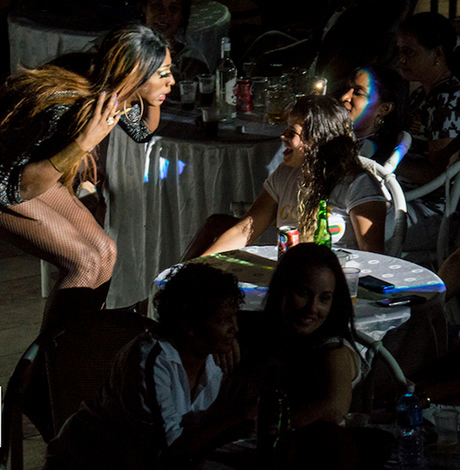
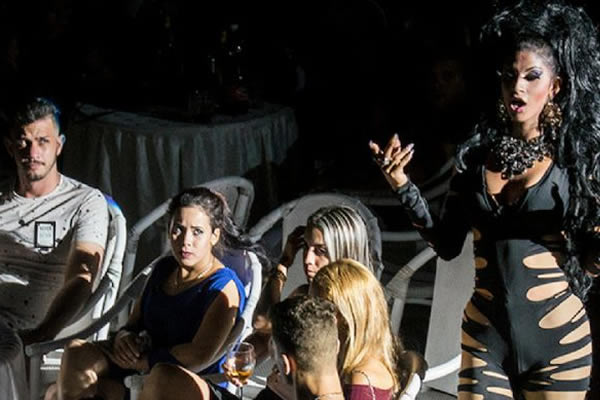
Una noche de sábado en el Cabaret Cubanacán, de Santa Clara. (Foto por Yariel Valdés González/Tremenda Nota)
Esa nota salió originalmente en el sitio web de Tremenda Nota.
SANTA CLARA, Cuba — Una de las ciudades cubanas más hospitalarias con las personas LGBTI+ también se debate entre la demanda de espacios exclusivos para las minorías sexuales y las desigualdades económicas que crecen en la Isla.
Cada sábado Miguel Antonio Castillo viaja cerca de dos kilómetros para encontrar una discoteca.
En San Diego del Valle, su primer destino, hay pocos lugares para bailar o simplemente disfrutar de espectáculos culturales. Por eso, desde que supo que existía una “noche para las personas LGBTI+” en Santa Clara, la capital de la provincia, Miguel Antonio decidió alargar su travesía por más de 30 kilómetros hasta el Cabaret Cubanacán.
“Las actividades que hacen allá [en San Diego del Valle] son muy generales,” se queja. “Y tampoco hay un día específico para los homosexuales.”
Al joven le seduce que “en las fiestas gais todos son gais.” Además, allí puede “encontrar amigos e intercambiar con personas que tienen gustos sexuales, estéticos o musicales similares, sin riesgo de sufrir homofobia.”
Más allá de las cabeceras municipales cubanas la recreación se reduce a una discoteca improvisada y a un parque central donde la gente se reúne a “cotillear.” Las fiestas concebidas para personas LGBTI+ tampoco son comunes más allá de La Habana y de algunas capitales provinciales.
En la pequeña ciudad de Camajuaní, a 20 kilómetros de Santa Clara, nunca ha prosperado una “fiesta diversa,” aseguran varias personas LGBTI+ entrevistadas por Tremenda Nota.
Según Leonel Jacomino Jiménez, promotor del proyecto Hombres que tienen sexo con otros hombres (HSH), las gestiones para crear un espacio inclusivo “tienen que hacerse sobre la base de cartas y tocando puertas para molestar a algunos funcionarios del gobierno.”
En otros casos, como ocurrió el pasado año en Sagua la Grande, una de las principales ciudades de la provincia, las fiestas LGBTI+ fracasan por falta de público o de buenas estrategias de promoción.
Solo el proyecto itinerante “Me incluyo,” organizado por el promotor cultural Ramón Silverio, creador y director de El Mejunje, ha presentado espectáculos de transformismo y otras actividades inclusivas en poblados y zonas apartadas.
Santa Clara, por su parte, cuenta con tres espacios que celebran las llamadas “fiestas gais,” y que incluyen shows de transformismo. El Centro Recreativo El Bosque, el Cabaret Cubanacán y El Mejunje de Silverio son los únicos lugares que introducen en su cartelera semanal una “noche diversa.”
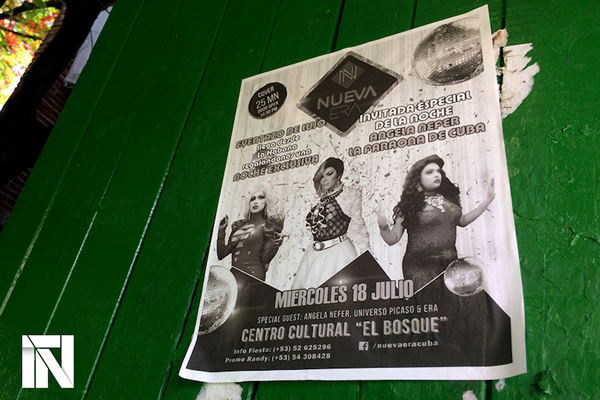
En la última década las “fiestas diversas” han alcanzado varias ciudades cubanas, aunque todavía La Habana y Santa Clara son las que ofrecen más opciones recreativas “exclusivas” para las personas LGBTI+. (Foto por Yariel Valdés González/Tremenda Nota)
¿Gueto homosexual?
Junto al Cabaret Cubanacán funciona otro espacio recreativo nombrado Disco Isla. Los públicos se muestran segregados cada sábado. De un lado hacen fila las personas gais, trans y lesbianas; del otro aparecen jóvenes heterosexuales que evitan mezclarse con “sus vecinos.” Las personas LGBTI+ permanecen en el gueto “asignado” socialmente.
“La creación de espacios exclusivos genera también una especie de exclusión,” cree Félix Izaguirre, un joven que hace fila para entrar a otra de las “fiestas diversas” de la ciudad.
“Mucha gente no va al Cabaret los sábados ni vienen a El Mejunje, precisamente porque saben que es noche gay,” dice. “Siempre existen heterosexuales que tienen amigos gais y los acompañan sin prejuicios, pero son los menos.”
Ramón Silverio creó hace más de tres décadas el centro cultural El Mejunje, acusado en sus primeros años de ser un “club exclusivo para personas gais.” Sin embargo, la institución sobrevivió el paso del tiempo y, en vez de apartar en un gueto a las personas LGBTI+, abrió las puertas al resto de la sociedad.
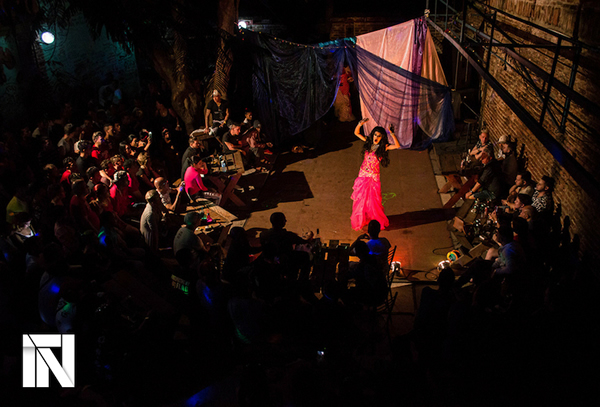
El público asiste a un show de transformismo en El Mejunje. (Foto por Yariel Valdés González)
Aun así, muchas personas homosexuales y transgéneros prefieren acudir a “espacios exclusivos para gais.” Javier Olivera, transformista que se presenta en el escenario de El Mejunje como Cinthia, aseguró que en sitios “aparentemente para heterosexuales” suele encontrarse conflictos entre la clientela homofóbica y los gais.
Por eso, Denet Oliva Triana, colega de Javier conocida como Blacuchini, respalda la existencia de lugares dedicados a la comunidad LGBTI+, aunque siente que está “en un círculo” que le lleva siempre al mismo sitio con la misma gente.
Si es caro no es incluyente
A pesar del éxito del Cabaret Cubanacán y del Centro Recreativo El Bosque ― actualmente en reparación ―, el sitio más popular para la comunidad LGBTI+ de Santa Clara sigue siendo El Mejunje, por sus razonables precios y su cercanía al centro de la ciudad.
“Cada uno se divierte donde le permiten sus ingresos,” aseguran varios entrevistados. Las incipientes clases sociales que se consolidan en Cuba hace más de una década también dividen a las minorías sexuales.
Al Cubanacán, al Bosque, van quienes cuentan con mejor economía, pues solo la entrada cuesta como mínimo 25 pesos (1 CUC, equivalente a un dólar). Ese precio, por ejemplo, quintuplica el valor del boleto de entrada a El Mejunje.
En un país donde el salario medio es 767 pesos mensuales (poco más de 30 dólares estadounidenses), “no se puede decir que un lugar sea inclusivo si cobra cuarenta pesos por la entrada,” advierte Ramón Silverio.
Reinaldo Gil, un joven artista plástico, confirma que “al Cubanacán va la gente que tiene un poco más de dinero.” Al principio, cuando acababan de abrir la “noche diversa” en el cabaret, “los mismos trabajadores de allí te discriminaban un poco, existía homofobia.”
“En el Carishow — una céntrica discoteca de la cadena de servicios extrahoteleros Palmares — a veces no aceptan que entren los homosexuales,” denuncia Gil.
Sin embargo, uno de los agentes de seguridad del Carishow aseguró a Tremenda Nota que allí nunca han existido manifestaciones de homofobia y que “se trata a todos los clientes por igual,” en tanto se comporten de acuerdo a “las normas generales establecidas” en el centro recreativo.
Hace algunos meses dos jóvenes fueron expulsados de Efe Bar, en La Habana, supuestamente por besarse dentro del establecimiento privado. También el KingBar, otro centro nocturno bastante frecuentado de la capital, invocó el derecho de admisión para negar la entrada al poeta Norge Espinosa y un grupo de activistas LGBTI+ en 2015.
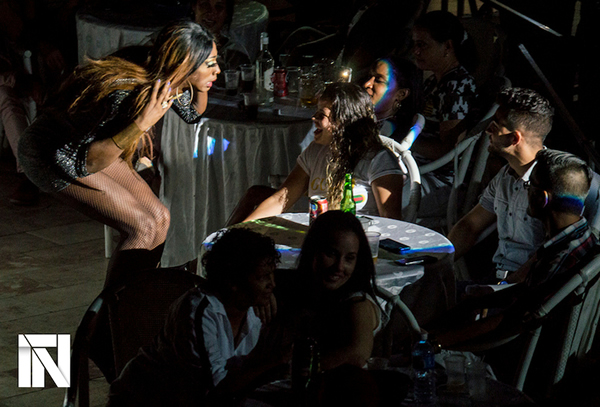
La transformista Blancuchini (a la izquierda) durante una de sus presentaciones en el Cabaret Cubanacán de Santa Clara (Foto por Yariel Valdés González)
Orlando Reinoso Castillo, barman del bar Tacones Lejanos de El Mejunje, se atreve a asegurar que este resulta el único sitio en la ciudad frecuentado a diario por personas gais que se mezclan sin dificultad con la población heterosexual, o con las chicas trans, o con los “pepillos.”
“A este lugar le llaman el bar de los escachados,” comenta, en alusión a los bajos ingresos de muchos clientes. “Además, aquí vienen las parejas, se besan y no pasa nada. La diversidad es tan natural en El Mejunje como sus ladrillos.”
District of Columbia
Gay Men’s Chorus of Washington to celebrate Spring Affair honorees
‘Their work inspires our music and deepens our mission’

For 44 years, the Gay Men’s Chorus of Washington (GMCW) has served as a powerful voice for love, unity, and pride among Washington’s LGBTQ community and its allies. Since its first performance in 1981—at the opening of the National Gay Task Force’s Washington office (later becoming the National LGBTQ Task Force)—GMCW has built a politically engaged and culturally significant legacy as one of the nation’s foremost LGBTQ performing arts organizations.
As its music and mission evolved, GMCW deepened its involvement in supporting LGBTQ individuals and allies alike. In 2004, the chorus launched its first Spring Affair fundraiser. This annual event not only generates financial support for the inclusive choral group, but also honors individuals and organizations in the Washington community who exemplify GMCW’s mission of unity, equity, and empowerment through music.
Each year at the Spring Affair gala, the chorus honors one community leader, one external organization, and one GMCW member. For the 2025 gala, GMCW will recognize Bishop Mariann Edgar Budde, Atlas Performing Arts Center, and GMCW member Keygan Miller.
“These honorees remind us why we sing,” said Thea Kano, artistic director of the Gay Men’s Chorus of Washington, DC, in an email. “In moments when our community has needed strength, they’ve offered hope. Whether it’s a brave voice from the pulpit, a tireless advocate for our youth, or an organization that opens its doors to every story—each has chosen to lead with love, truth, and courage. Their work inspires our music and deepens our mission.”
GMCW will honor Bishop Mariann Edgar Budde, the first woman elected to lead the Episcopal Diocese of Washington, as its 2025 individual award recipient. A longtime champion of equity and inclusion, Bishop Budde gained national prominence during the Inaugural Prayer Service at Washington National Cathedral, where she spoke directly to newly sworn-in President Donald Trump.
“Have mercy, Mr. President,” she implored, lifting the hopes of the most vulnerable Americans targeted by Trump’s policies—particularly LGBTQ and immigrant communities. Her bold words signaled to the nation that she remains a genuine and outspoken voice for justice, unity, and truth, inspiring compassion and faith within and beyond her religious community.
GMCW will present the Harmony Award for an Organization to the Atlas Performing Arts Center, located in the historic H Street, N.E. corridor. In 2024 alone, Atlas hosted more than 400 events and provided $1.6 million in free and discounted tickets, arts education, community programming, and space use. Through this work, Atlas has amplified “artistic voices that reflect the full diversity of our community.”
The center has long partnered with GMCW, offering space for open mic nights, cabarets, GenOUT Chorus events like the Youth Summit, and even memorial services such as that for Bobby T. Boaz. Atlas exemplifies GMCW’s mission of storytelling, equity, and civic connection through programs like the INTERSECTIONS Festival and City at Peace.
“We are absolutely thrilled and deeply honored that the Atlas Performing Arts Center has been named a recipient of the GMCW Harmony Award! This recognition is a powerful affirmation of our commitment to uplifting voices, fostering inclusive creative expression, and building a space where everyone feels seen, heard, and celebrated,” said Jarrod Bennett, Executive Director of the Atlas Performing Arts Center.
“At the Atlas, our mission is rooted in the belief that the arts are for everyone—and that through performance, dialogue, and community, we can help shape a more just, compassionate world. To be acknowledged by the Gay Men’s Chorus of Washington, DC—an organization that has long stood at the forefront of championing equality and advancing the well-being of the LGBTQ+ community—is a profound and humbling honor. We continue to be inspired by GMCW’s work and are proud to stand alongside them in this shared vision. Thank you, GMCW, for this beautiful recognition. We carry it forward with gratitude and renewed energy for the work ahead.”
Finally, GMCW will honor Keygan Miller, a chorus member since 2017, for their leadership, advocacy, and commitment to equity both onstage and off. Within GMCW, Miller served as Vice President of Diversity and Inclusion, led conversations to expand trans inclusion, authored the “Day One” pledge, and played a critical role in shaping inclusive programming.
Outside the chorus, Miller serves as Director of Public Training for The Trevor Project, a national nonprofit focused on crisis intervention and suicide prevention services for LGBTQ youth under 25. They previously worked as an Advocacy Manager at the Trevor Project, where they championed policies protecting LGBTQ+ youth at every level of government.
As GMCW continues its mission to uplift and unite through music, the organization encourages new voices to join its ranks. GMCW welcomes all singers—regardless of gender identity or sexual orientation—who can sing in the lower vocal registers.
The 2025 Spring Affair Gala will take place on May 17, 2025, at The Ritz-Carlton, Washington, D.C. This annual benefit supports GMCW’s artistic and educational programming. For tickets, audition information, and more, visit GMCW.org.
Congress
Goodlander endorses Pappas’s Senate bid
Announcement puts gay congressman on the path to securing his party’s nomination
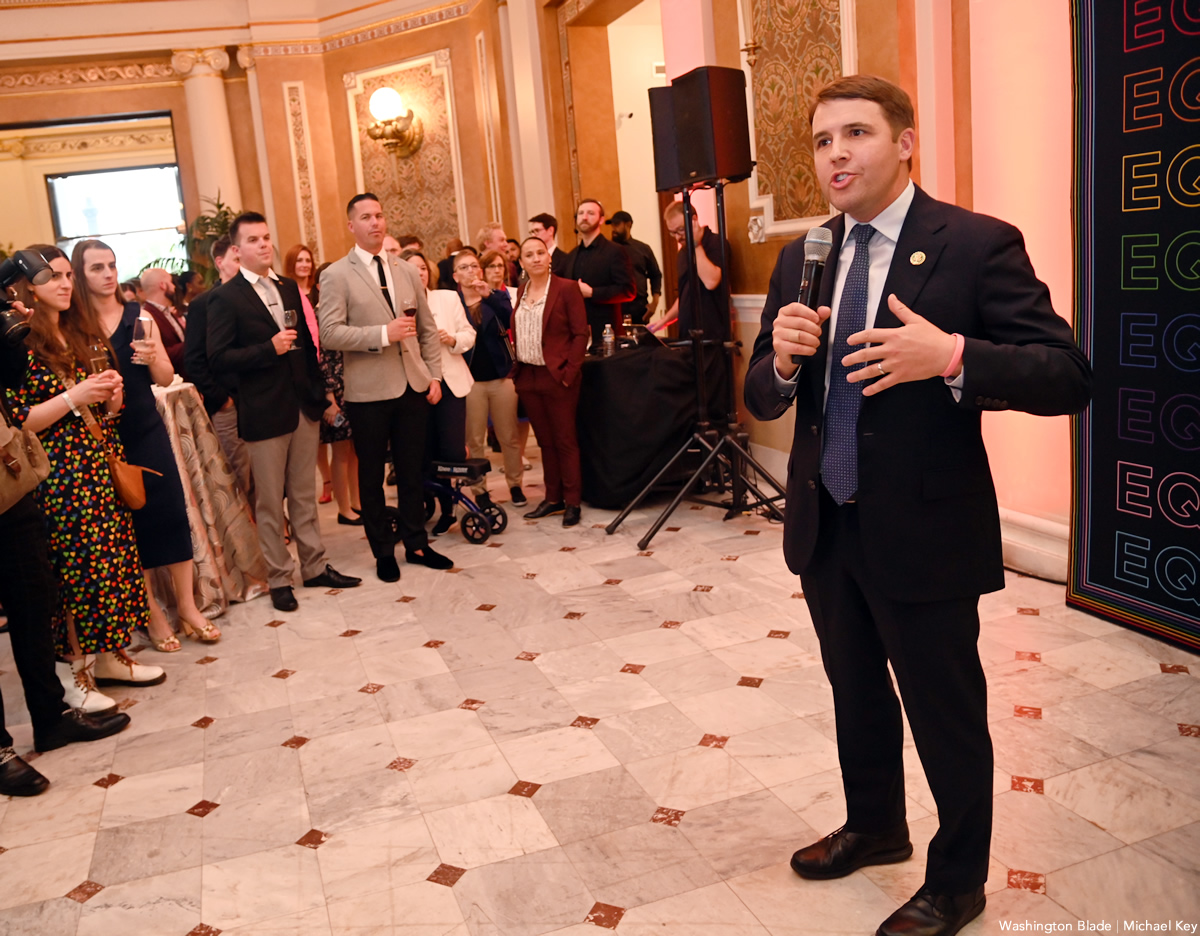
U.S. Rep. Maggie Goodlander (D-N.H.) on Thursday announced she will not run to represent her state in the U.S. Senate, endorsing gay U.S. Rep. Chris Pappas’s (D-N.H.) bid for the seat of retiring U.S. Sen. Jeanne Shaheen, putting him on the path to secure the Democratic nomination.
“We are in the fight of our lifetimes right now, of a moment of real crisis and challenge,” she said. “I feel humbled and grateful to so many people across our state who have encouraged me to take a look at the U.S. Senate, and after a lot of thought and conversations with people I love and people I respect and people who I had never met before, who I work for in this role right now, I’ve decided that I’m running for re election in the House of Representatives.”
When asked by a reporter from the ABC affiliate station in New Hampshire whether she would endorse Pappas, Goodlander said, “Yes. Chris Pappas has been amazing partner to me in this work and for many years. And I really admire him. I have a lot of confidence in him.”
She continued, “He and I come to this work, I think with a similar set of values, we also have really similar family stories. Our families both came to New Hampshire over 100 years ago from the very same part of northern Greece. And the values that he brings to this work are ones that that I really, really admire. So I’m proud to support him, and I’m really excited to be working with him right now because we’ve got a lot of work to do.”
Today in Salem @MaggieG603 tells @WMUR9 she is not running for U.S. Senate & endorses @ChrisPappasNH #NHPolitics #NHSen #NH02 #WMUR pic.twitter.com/W2CMrhRuIC
— Adam Sexton (@AdamSextonWMUR) April 17, 2025
“Maggie Goodlander has dedicated her career to service, and we can always count on her to stand up to powerful interests and put people first,” Pappas said in a post on X. “I’m so grateful to call her my friend and teammate, and I’m proud to support her re-election and stand with her in the fights ahead.”
Earlier this month, former New Hampshire Gov. Chris Sununu, a Republican, announced he would not enter the Senate race, strengthening the odds that Democrats will retain control of Shaheen’s seat.
Obituary
Local attorney, LGBTQ rights advocate Dale Sanders dies at 75
Acclaimed lawyer credited with advancing legal rights for people with HIV/AIDS
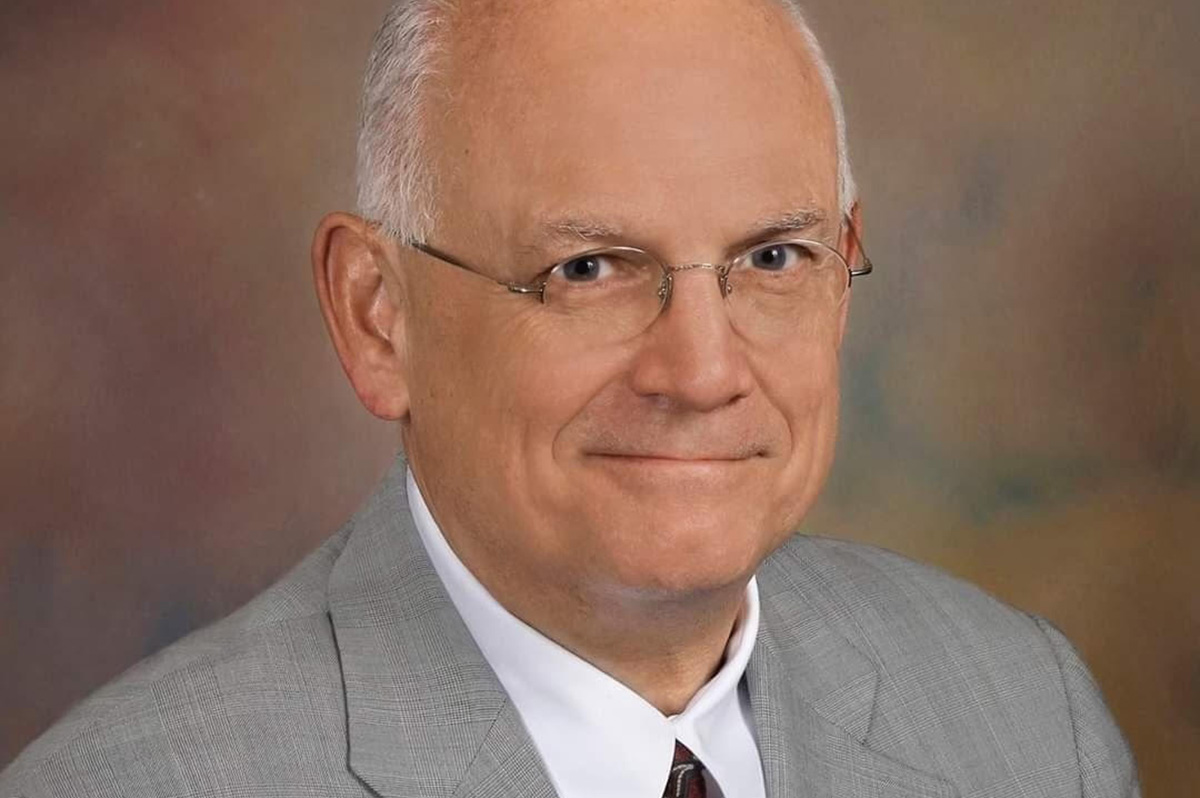
Dale Edwin Sanders, an attorney who practiced law in D.C. and Northern Virginia for more than 40 years and is credited with playing a key role in providing legal services for people living with HIV/AIDS beginning in the early 1980s, died April 10 at the age of 75.
His brother, Wade Sanders, said the cause of death was a heart attack that occurred at Johns Hopkins Hospital in Baltimore shortly after he had back surgery.
Wade Sanders described his brother as a “trial lawyer, passionate criminal defense, and civil litigator for human rights” for close to 50 years, with some of his work focused on “civil law, notably gay-related insurance discrimination during the AIDS epidemic.”
He called his brother “a zealous advocate for the oppressed, his clients, and his personal convictions.”
Born in Arlington, Va., and raised in McLean, Va., Dale Sanders graduated from Langley High School in McLean and received his bachelor’s degree from the University of Virginia, his brother said. He received his law degree from D.C.’s American University Washington College of Law and began his law practice in 1976 in Old Town, Alexandria, Wade Sanders said.
Amy Nelson, director of Legal Services for D.C. ‘s Whitman-Walker Health, said Sanders became one of Whitman-Walker’s original volunteer pro-bono attorneys in the 1980s.
“Dale was a beloved part of the legal services program and our medical-legal partnership for nearly 40 years,” Nelson said. “Dale was one of the clinic’s first volunteer attorneys at Whitman-Walker’s weekly, legal walk-in clinic offering free counseling to clients about their legal rights in the face of HIV/AIDS and LGBT discrimination from employers, landlords, medical providers, and insurance companies,” according to Nelson.
Nelson added, “Dale represented dozens of people impacted by the ignorance and prejudice attendant to an HIV/AIDS diagnosis, and his litigation wins were instrumental in advancing the legal rights of persons living with HIV/AIDS.”
Sanders’s most recent case on behalf of Whitman-Walker took place in 2023 in support of a transgender woman in Virginia who faced discrimination from her employer and health insurer, Nelson said.
In 1989, Whitman-Walker presented Sanders with its Gene Frey Award for Volunteer Service, and in 1994 presented him with its Founders Award for Pro Bono Legal Services, Nelson told the Blade. She said in 2024, Whitman-Walker re-named its annual Going the Extra Mile Pro Bono Award as the Dale Sanders Award for Pro Bono Excellence.
“Dale’s legacy helped to shape HIV/AIDS law, and his fierce commitment to justice will live on at Whitman-Walker Health,” Nelson said in a statement. “We will miss him dearly.”
Daniel Bruner, who served as Whitman-Walker’s legal services director prior to Amy Nelson taking that position, said Sanders played a role in shaping his own legal skills and knowledge.
“Dale was one of my earliest legal models among local, and national, advocates for people living with HIV and LGBT people,” Bruner told the Blade. “He was a fierce, persistent advocate for his clients and for the community,” Bruner said, adding, “He won key victories in several cases where employees’ or health care patients’ privacy had been egregiously violated. I certainly will never forget him.”
Wade Sanders said his brother was also an avid bridge player, saying he played competitively. “He earned the rank of Ruby Life Master, a pretty big deal in the bridge world,” Wade Sanders said.
Dale Sanders is survived by his husband, Christian Samonte; his sister, Joyce Sanders of York, S.C.; his brother Wade Sanders of West Jefferson, N.C.; and his beloved dogs Langley and Abigail, his brother said in a statement.
A memorial service for Dale Sanders organized by the Sanders family and the LGBTQ Catholic group Dignity Washington will be held Saturday, May 10, at 1 p.m. at St. Margaret’s Episcopal Church at 1830 Connecticut Ave., N.W. in D.C., a Dignity Washington spokesperson said.
-

 District of Columbia5 days ago
District of Columbia5 days agoFinal push to raise funds, fill D.C. hotels as WorldPride nears
-

 El Salvador3 days ago
El Salvador3 days agoGay Venezuelan makeup artist remains in El Salvador mega prison
-

 District of Columbia4 days ago
District of Columbia4 days agoReenactment of 1965 gay rights protest at White House set for April 17
-

 Maryland5 days ago
Maryland5 days agoFreeState Justice: Transgender activist ‘hijacked’ Moore’s Transgender Day of Visibility event











